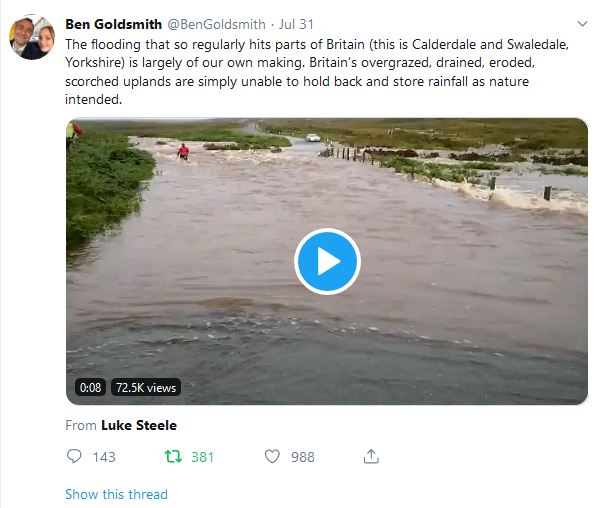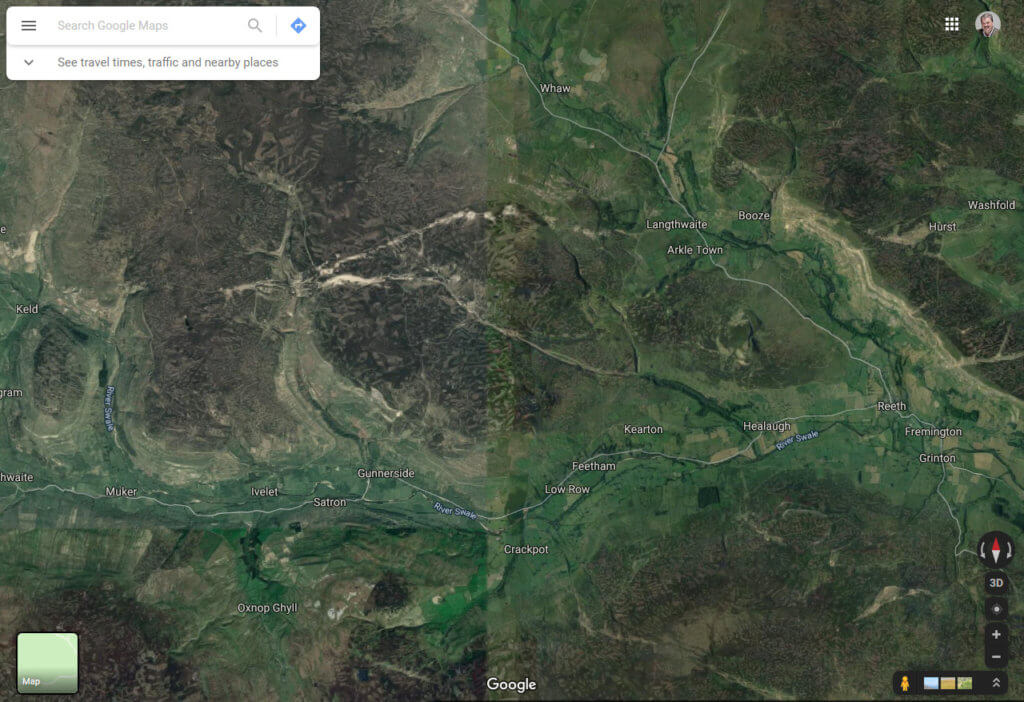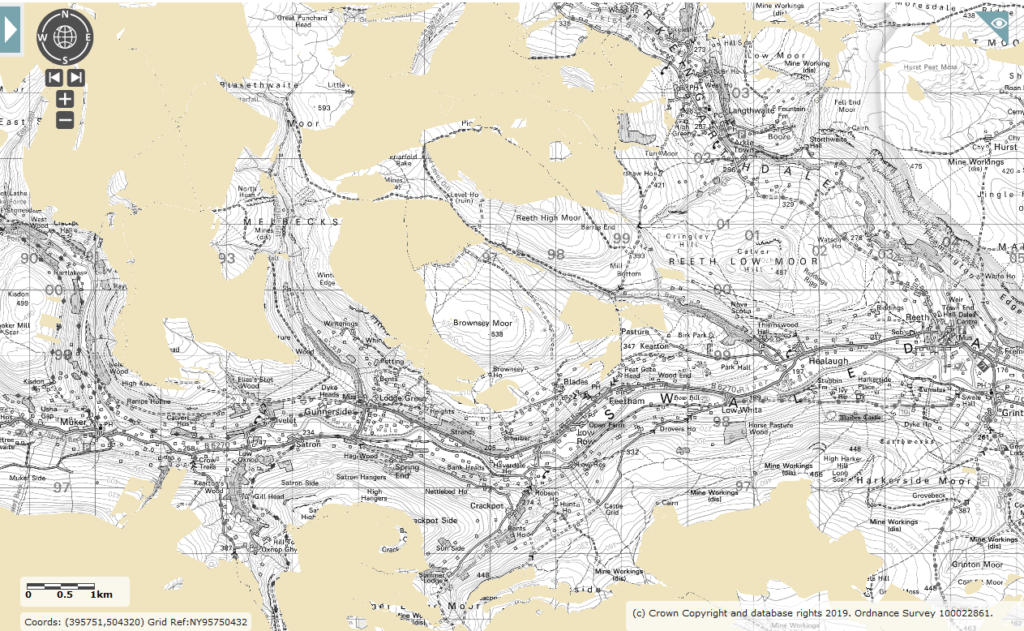Farming Today irritates me a lot – and it would iritate me often if I listened to it often but its timing means I am usually finishing the first piece of work of the day prior to making the first cup of tea of the day.
But sometimes, as with yesterday morning, I give it a go and am metaphorically shouting at the radio in a way that not even the likes of Jacob Rees-Mogg or Dominic Raab can make me do. And so it was yesterday when Farming Today interviewed Julia Aglionby about flooding – allegedly.
The piece can be listened to here and it starts after about 3mins 28secs.
The hook for the piece was this tweet by Ben Goldsmith;

You see that the phrase that will have been noticed by many, including myself, is ‘Britain’s overgrazed, drained, eroded, and scorched uplands are simply unable to hold back and store rainfall as nature intended.’. The only bit I’d part company with is the ‘as nature intended’ because as an evolutionary biologist by training i regard ecosystem services as emergent properties rather than aims (but no matter!).
Ben Goldsmith’s tweet was read out and he was described as an environmental campaigner. I don’t know Ben except by reputation and I suspect that he wouldn’t mind being called an environmental campaigner though his biography as a non-exec board member of Defra doesn’t portray him in that way at all and nor does his Wikipedia entry but clearly Farming Today has a better grip on Goldsmith’s activities and motivations. Or maybe the BBC, and Farming Today, use campaigner as a general perjorative term these days?
The person chosen to reply on behalf of the world to Goldsmith’s tweet was Julia Aglionby, the Chief Exec of something called the Uplands Alliance which Farming Today described as ‘a network of people including farmers and conservationists’ and which describes itself as a ‘Policy Lab for the Uplands’ but which comes across these days, whatever its origins, as a campaigning group for farmers and landowners to get money from the rest of us. Farming Today did not describe Julia Aglionby as an agricultural campaigner even though she ended the interview asking for more money to be given more easily to upland farmers.
Aglionby says that farmers and landowners have been working very hard to restore blanket bogs – but she doesn’t say that blanket bogs are restored (I notice). I have no great personal knowledge of Swaledale, apart from the odd short visit, but I wonder whether the blanket bogs are restored or are being restored – there is a big difference. It’s the difference between being thin and being on a diet (not that I’d know much about either) And it’s not just about blanket bog anyway, land that is burned will shed water more quickly than unburned land, and a lot more quickly than land with natural woodland on it. Ben has a good point I think.
One has only to glance at the area on Google maps to see the characteristic pattern of intensively burned heather that characterises land managed for driven grouse shooting…

The Swale runs West-East in this image and towards the right hand side of the image are Reeth and Grinton both of which suffered floods last week.
If we look at the area of land that is classed by Natural England as blanket bog then it looks like this (the buff-coloured bits) for the same area;

So there is masses of blanket bog which has been burned on rotation, which will affect its water-holding capacity and which should be outlawed these days by the voluntary code which Michael Gove pretended would solve the problems of upland burning. Ben Goldsmith described the uplands as ‘scorched’ and you can’t really argue with that, and Aglionby wasn’t asked about that, but was allowed to stick to what may well be perfectly true – that these uplands aren’t overgrazed (which no-one has specifically said they were – although I reckon I can remember some pretty knackered overgrazed moors on the road a bit further up the dale).
Not that Aglionby is an agricultural campaigner, of course, but when she was asked whether she believed that future agricultural support should reward landowners for managing the land to reduce water flows she seemed y to me to sidestep the question and went on to campaign for changes in the current system to allow farmers to be ‘properly’ rewarded for doing more, although we never hear agricultural campaigners arguing the other side of the coin that farmers should be penalised for not doing enough – it’s always more, more, more handouts because that is what agricultural campaigners always want. When Aglionby says ‘it’s really important that those who do the work and protect downstream communities should be properly rewarded’ the most obvious source of money would be to take it away from those farmers who are not doing the work to reduce flood risk and are not protecting downstream communities – one could start with a few grouse moors for example although removal of grants will not ensure environmental good behaviour, only regulation does that if designed and then properly enforced.
What we all listened to on Farming Today was one person’s tweet read out on air – a tweet which was clearly about the uplands as a whole, not about one place in particular (although illustrated by floods in some upland areas recently) which was then answered by reference to one factor (grazing), in one place (upper Swaledale) rather than generally. You don’t have to be a Professor of Logic to note the mismatch.
Now, the floods in Swaleale wouldn’t have happened if it hadn’t rained very hard, but would they have happened in the same way if land use were different and grazing pressure were lower, drainage was less intensive and upland burning were less widespread and less intensive? Whatever the answer for Swaledale, the evidence is there that overall we would reduce flood risk if we changed upland land use and that is where government policy is heading, rather slowly.
By the way, Julia Aglionby was until recently a Board member of Natural England.
[registration_form]
Yes, farmers seem to want all the credit for doing good things, but none of the blame for doing bad ones, and lots of money for doing whatever they feel like.
Spot on!
I’ve never met a farmer that didn’t have their hand out for a handout, nor one that wasn’t cooking the farm books neither. Crooks, the lot of them.
Nationalise the farming industry, that is what I say. People keep comparing Brexit, the Brexit that farmers wanted, to WW2; well bring back the War Ag and the kicking of uncooperative farmers off the land, just like in the war. It is exactly what the farmers wanted, they shouldn’t complain about that now.
I think it’s unfair to single out farmers. Muggers should be properly rewarded for not beating up old ladies in the street, as well.
Did you hear in Sunday’s Broadcasting House (at about 15m 10s) the vox pop with the wife of the gamekeeper on Grinton Moor who said her husband was “in tears” about the “devastation” on the moors.
I’m fairly sure this was due to the effects of the floods and not an epiphany about the ecological denudement of the moors…
Jeff P – I did hear that.
I didn’t hear it but sort of know that keeper, who incidentally works for Lord Peel and used to be a volunteer fireman. Grinton Moor is over burnt and over-drained. With a rapid stream running off that took out the bridge between Grinton and Leyburn.
The real problem is that its very steep much of the area does not grow good vegetation because of past lead mining, this is true of much of Swaledale and Arkengarthdale. however Reeth and Grinton flooded because of the conjoining of Arkle beck, which drains Arkengarthdale, Cogden and Grinton Gills drain Grinton moor and all meet the Swale between Reeth and Grinton Bridge. Probably all exacerbated true by lots of intensively managed grouse moors with steep run off slopes and lots of sheep between the moors and the valley bottoms, although the steepest slopes are past lead mine hushes and don’t grown good vegetation as I have said.
My experience is that generally overgrazing is not as bad as it was 20-30 years ago when farmers got headage payments, but there is little real incentive for moor owners to block all grips and burn much less. They think this will reduce heather cover compared to other vegetation thus reducing grouse density and encourage things like hen harriers, which they believe despite evidence to the contrary will reduce grouse density further. What we need is not only regulation but a land tax for all commercial enterprises to help pay for real flood relief ( including beavers and trees)not flood barriers.
Hi Jeff
Couldn’t agree more. Crying also because the flooding has taken out and damaged numerous stretches of moorland tracks meaning that taxi-ING the grouse shooters gamekeepers and beaters from drive to drive is going yo be very difficult.
Also the torrential rain has reduced the grouse numbers yet further.
When will local people start to understand the damage Grouse Moor owners are inflicting on the local environment and communities.
I was living in Far Cotton, Northants the Easter it got flooded out so seen some serious downpours. I was in the area coming back from a delivery and words fail me to describe the sheer amount of rain. It became unsafe to drive, so dark and no spots of rain it was just heavy from the outset. It was if a massive water balloon overhead just burst and it just kept getting heavier my wipers falling to clear the screen. I pulled onto a layby, as did everyone. Surface water was about an inch deep in the road in seconds but luckily we weren’t in the worst areas. A major road for the area shouldn’t flood so quick.
But it isn’t just the lack of trees or peat.
Do something tommorow, on your ventures have a look down a few drains as you walk past them. Maybe it’s just this region but every drain I see (sad & disgusting habitat of disposing of cigarettes down them) is full to the top with mud, where is even the smallest of showers going to run off into ?
Entropy is such a nuisance
I would have thought (please correct me if I am wrong) that there is the potential for a criminal offence being committed here. As far as I can remember, the Criminal Damage Act makes it an offence to intentionally or recklessly damage the property of another. If it could be proved that a grouse moor owner, by his drainage policy, caused flooding to property downstream, then I think that there might be a case for the local community affected to sue that person for the damage/hardship caused. This would be especially true if the landowner was made aware of the damage he was causing and made no attempt to rectify the situation. I think that the situation as it stands now is becoming clearer that these floods are exascerbated by DGM policies and that, not only should the local communities hit the moor owners in the pocket for the damage caused by their activities but the emergency services, who are called in to assist, should bill them too!
Mark, here’s more on what Ben Goldsmith thinks on a range of issues via my exclusive interview earlier this year https://www.rics.org/de/news-insight/future-of-surveying/sustainable-building/land-natural-capital-and-the-environment/ best, Rob
It’s not just farmers. EA continues in its total belief in heavy engineering despite failure after failure. Have a look at its staggering proposals for £150 million flood defence for Oxford – rather than working with the flood plain, as demonsrated over centuries by Port Meadow they plan to lowera whole area right beside the city to store water. Is their main duty to the Civil Engineering industry or to people at risk from flooding ? Hard to tell really. In the meantime they don’t even seem to be on the pitch as far as mismanagement of the uplands goes.
“would they have happened in the same way if land use were different and grazing pressure were lower, drainage was less intensive and upland burning were less widespread and less intensive?”
A hydrologist will tell you that yes, those things do make a *very significant* difference to the time it takes for water to travel from the upper catchment to the main watercourse. It isn’t new, the Institute of Hydrology was studying this on the upper Severn and Wye catchments back in the 1980s. We’ve seen the benefits in the ‘Slow the Flow’ project above Pickering and in various studies over the years – one I’ve followed is the Pontbren project in Montgomeryshire. Coincidentally, Montgomeryshire Wildlife Trust is working with agencies on the slopes of Pumlumon to bring about some of these benefits.
In my experience with Welsh hill farmers they’ll do whatever they can get a grant for. In the 1970s they were paid to drain poor, boggy fields and apply as much nitrate fertiliser as they wanted. Only recently has the legacy of those things (and more) been exposed as misguided and destructive. But until the system changes the farmers and landowners won’t change; and until we have a Department and government that cares about these things then nothing will change.
Simon – thank you for your first comment here.
Strange mixture of discussion of farming and of managing grouse moors on this bloge..as though they are the same in Swaledale…are they?…the radio piece only mentioned farming…
Dave – the piece started with Ben Goldsmith’s tweet which mentioned scorched uplands – which I am pretty sure we can take to mean driven grouse moors. And then, indeed, it went into talkng more or less solely about lack of overgrazing in one particular place as though that were an answer.
I share your irritation with Farming Today, Mark and in fact with the whole of the BBC generally. The quality of their programmes, which they so often insist in calling “shows”, are becoming poorer by the week as well as their ability to put forward a true, balanced, factual, and unbiased presentation of issues.